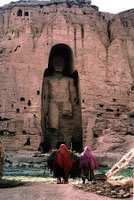
The Director-General of UNESCO, Koïchiro Matsuura, issued a declaration on the crisis in the Middle East on August 11, 2006. It includes the following:
“In my capacity as Director-General of an organization dedicated to the construction of the defenses of peace in the minds of women and men through education, science, culture and communication, and in view of the spiraling conflict in the Middle East, I wish to express my dismay at the growing loss of life, suffering, and destruction on each side, and express my fear that the grief caused by present events will jeopardize the future.Click here to read the full declaration.
“We can only be alarmed by the impending humanitarian disaster in Lebanon that will compound the environmental disaster already unfolding before us. But an even greater threat looms: what future for a country where so many people have been displaced, lived through fire, turmoil and death omnipresent? What future for a country where so many children have seen their schools destroyed, a country whose memory is ravaged along with its rich heritage of prestigious sites that are the heritage of humanity as a whole? And what prospects can there be for the construction of a knowledge society in a country sapped by the loss of its vital energy and talent?"
Earlier, the Director-General had convened a special session of the UNESCO Middle East Task Force to discuss UNESCO’s response to the crisis in Lebanon. In his opening remarks at the meeting, the Director-General joined the United Nations Secretary-General in calling for a way out of the crisis referring to the three pillars of the UN position expressed by the Secretary-General, namely, a cessation of hostilities, a political framework which includes the deployment of an international force, and agreement on a reconstruction programme. Mr Matsuura expressed his “deep concern about the escalation of violence and the tragic loss of human life”, and urged for “preparedness to assist the Lebanese authorities in early recovery and reconstruction efforts.” Click here to read more about the Task Force.
These expressions of concern about the current situation are part of the six decade long effort of UNESCO to promote peace. See, for example, this statement made a decade ago by a former Director General of UNESCO, Federico Mayor, to the Nuclear Age Foundation, in which he said:
In 1995, the fiftieth anniversary of the United Nations and UNESCO and the United Nations Year for Tolerance, we stressed that it was only through a daily effort to know others better - I am the 'other'! - and respect them that we would be able to tackle at source the problems of marginalization, indifference, resentment and hatred. This is the only way to break the vicious circle that leads from insults to confrontation and the use of force.
We must identify the roots of global problems and strive, with imagination and determination, to check conflicts in their early stages. Better still prevent them. Prevention is the victory that gives the measure of our distinctively human faculties. We must know in order to foresee. Foresee in order to prevent. We must act in a timely, decisive and courageous manner, knowing that prevention engages the attention only when it fails. Peace, health and normality do not make the news. We shall have to try to give greater prominence to these intangibles, these unheralded triumphs.
A universal renunciation of violence requires the commitment of the whole of society. These are not matters of government but matters of State; not only matters for the authorities, but for society in its entirety (including civilian, military, and religious bodies). The mobilization which is urgently needed to effect the transition within two or three years from a culture of war to a culture of peace demands co-operation from everyone. In order to change, the world needs everyone. A new approach to security is required at world, regional and national levels. The armed forces must be the guarantors of democratic stability and the protection of the citizen, because we cannot move from systems of complete security and no freedom to systems of complete freedom and no security. Ministries of war and defence must gradually be turned into ministries of peace.
